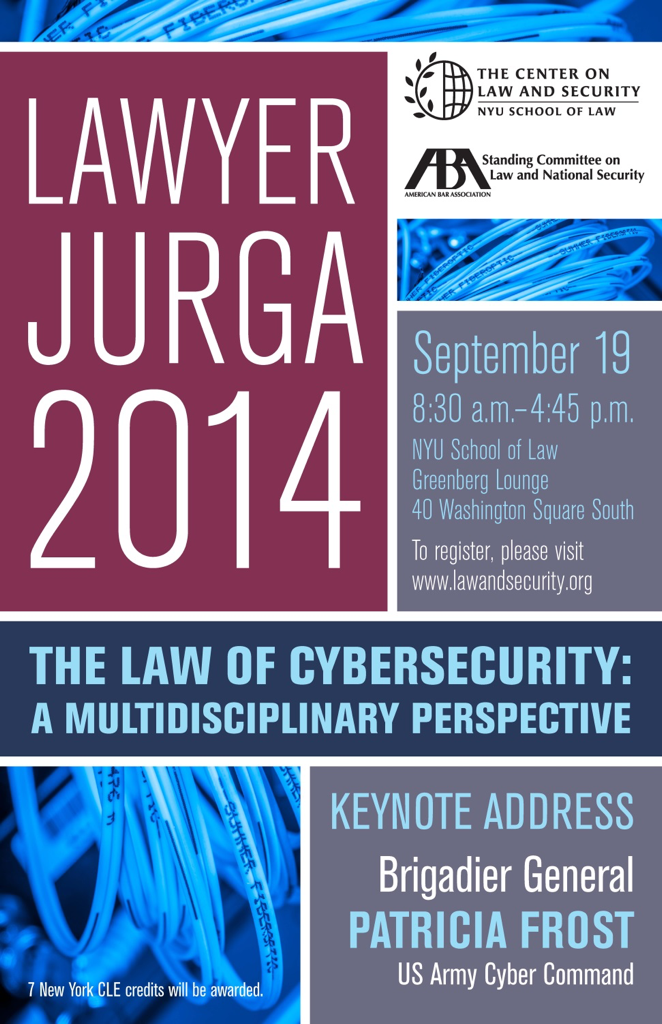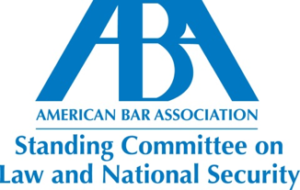
- This event has passed.

The Law of Cybersecurity: A Multidisciplinary Perspective
September 19, 2014 @ 4:30 am - 12:30 pm
To watch videos of the conference please click below:
Panel 1: Cybersecurity and the Private Sector
Panel 2: Cybersecurity Investigations
Panel 3: The Law and Strategy of Cyber Conflict
Panel 4: Looking Ahead: Changes in the Cybersecurity Landscape
September 19, 2014
8:30 a.m. – 4:30 p.m.
Greenberg Lounge
40 Washington Square South
NYU School of Law

Keynote Address: Brigadier General Patricia Frost, U.S. Army Cyber Command
Panel I: Cybersecurity and the Private Sector
- Judi Germano, Center on Law and Security, NYU School of Law
- Leonard Bailey, U.S. Department of Justice
- Randal Milch, General Counsel, Verizon Communications
- Daniel Weitzner, Massachusetts Institute of Technology
- Michael Vatis, Steptoe & Johnson
Panel II: Cybersecurity Investigations
- Andrew Weissmann, Center on Law and Security, NYU School of Law
- David Bitkower, U.S. Department of Justice
- Steve Vladeck, American University Washington College of Law
- Bill Banks, Syracuse University College of Law
- David Szuchman, Manhattan District Attorney’s Office
Panel III: The Law and Strategy of Cyber Conflict
- Matt Waxman, Columbia Law School
- Gary Brown, International Committee of the Red Cross
- Herbert Lin, The National Academies
- Ryan Goodman, NYU School of Law
- Jaan Priisalu, Director General, Estonian Information System Authority
Panel IV: Looking Ahead: Changes in the Cybersecurity Landscape
- Harvey Rishikof, American Bar Association, Standing Committee on Law & National Security
- Steven Bellovin, Columbia University
- Elizabeth Rindskopf Parker, Center on Law and Security, NYU School of Law
- Paul Rosenzweig, Red Branch Consulting, The Chertoff Group
7 New York CLE credits will be awarded.
The study, practice, and teaching of cybersecurity is inherently interdisciplinary, implicating disparate bodies of legal and non-legal expertise. The questions of law and policy involved in guarding against cyberthreats are so varied because the threats themselves take on many forms, including: attacks on critical infrastructure perpetrated by foreign governments or terrorist organizations; theft of trade secrets or significant intellectual property by state-linked or other entities; traditional espionage conducted by foreign intelligence services; “insider” threats from corporate or government employees; cybercrime that results in the theft of valuable financial information like credit card data; cybercrime that leads to identity theft in furtherance of other offenses; “hacktivism,” denial of service attacks, and other forms of cyber-vandalism; and many others. These threats target different vulnerabilities and demand different responses from government and the private sector.
At the same time, uncertainty about the rights and obligations (both statutory and constitutional) of private and public actors have clouded the legal landscape governing cybersecurity. Future generations of lawyers called upon to address cybersecurity challenges will, therefore, need to become fluent in a wide range of legal and non-legal languages. The 2014 “Lawyer Jurga,” co-hosted by the Center on Law and Security at NYU School of Law and the ABA Standing Committee on Law and National Security, will convene leading scholars and practitioners to address cutting-edge issues in cyberlaw from a multidisciplinary perspective. It aims to inform legal academics about the wide range of legal issues they will confront in teaching about cybersecurity, and to assist practitioners in refining the expertise necessary to advise clients effectively.

